Peter MALONE
Saturday, 18 September 2021 19:25
Stammheim
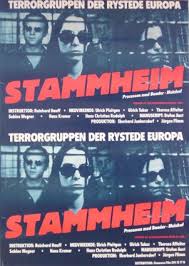
STAMMHEIM
Germany, 1986, 107 minutes.
Directed by Reinhard Hauff.
Stammheim won the Golden Bear Award at the Berlin Film Festival of 1986. It was adapted by writer Stefan Aust from the transcripts of the Baader Meinhoff Trial of 1975-77 (a case which lasted 192 days). The film is an excellent courtroom drama, highlighting each of the characters, their stances, their attitudes, the tension with the presiding judges.
The film was directed by activist Reinhardt Hauff (director of such films as Slow Attack). He highlights the personalities of the Baader Meinhoff gang, strengths and weaknesses. He dramatises their behaviour in the trial - and dramatises several scenes outside the courtroom which were based on diaries and evidence from warders. While the film has a particular point of view, it also serves as a fairly objective look at a German court case. However, Hauff wants to make the point that the political authorities wanted a 'Guilty' verdict without possibility of appeal. There was bias in the proceedings for political purposes. In retrospect, the film is able to highlight the injustice done in terms of Germany's civil law.
The film also has the background of Germany from the '30s to the '70s, the move from the adoption of National Socialism to the experience of the war, to the post-war boom and the student revolutions of the late '60s. The film is always absorbing - but will naturally be controversial for audiences who have strong views about terrorism and court proceedings.
1. The work of Reinhardt Hauff? His position in the German film industry? his political commitments?
2. Audience knowledge of the Baader Meinhoff gang? Their origins? Activities in Germany? Terrorism and the reaction of the German government? The background of German history, the 1930s, the war, post-war boom, student protest? The experience of violent protest? Terrorism? The possibilities of proper processes? Causes? Reasons for government clampdown? The court case as an example of contemporary justice?
3. The world, understanding of the Baader Meinhoff gang - as filtered through media reports, in reaction to world terrorism? How accurate was the general public's knowledge of the persons, their activities? Does the film make a difference?
4. The use of the transcripts for writing of the screenplay? The inventing of several sequences based on fact and reports? The processes of selecting particular events from the transcripts for dramatising? For objectivity? A committed point of view? Bias?
5. How well did the film work dramatically: the slow tracking of the exteriors of the prison? The sequences in the cells? The courtroom and the fluid camera movement? Particular focal points?
Published in Movie Reviews
Published in
Movie Reviews
Tagged under
Saturday, 18 September 2021 19:25
Stand and Deliver
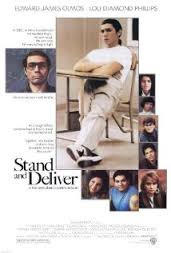
STAND AND DELIVER
US, 1988, 102 minutes, Colour.
Edward James Olmos, Andy Garcia, Lou Diamond Philips.
Directed by Edward James Olmos.
Stand and Deliver was one of the popular successes of 1988. Edward James Olmos (Miami Vice, Saving Grace) was nominated for an Oscar for his persuasive performance as Jaime Escalante, a Colombian-born teacher in East Los Angeles who, with his dedication, was able to train students in mathematics and calculus. It is a true story and charts the experience of the class of 1982. The end of the film gives statistics about the continued success and the growing number of students passing calculus exams in this school.
The film is in the tradition of To Sir With Love, though Olmos's Escalante is not a glamorous figure. He is very demanding, eccentric in his style, full of generosity but with a touch of the tyrant. There is also a glimpse of his home life. However, it is with the students and his helping them to gain self-respect that the film comes alive - even a film about calculus.
The final crisis of the film is that the good results of the students seem to indicate cheating and so the pressure on the students is strong and they sit for the exam again. The supporting cast includes Lou Diamond Phillips (La Bamba, Young Guns) and Andy Garcia (The Untouchables) as one of the inspectors.
1. A powerful film about education? American settings, universal values? The film's acclaim?
2. The atmosphere of East Los Angeles, Garfield High School, the streets, homes? Authentic?
3. The credibility of the plot: a true story, the experiences of the 1982 class? Escalante himself and his personality, his interaction with the students, the results and the success up to 1987?
4. The quality of the screenplay on teaching, on teaching mathematics, calculus? The portrait of Escalante. his teaching methods, his clever style? Humour? Musical score, songs?
5. The title and the ironies of highwaymen and standing and delivering? The teacher standing and delivering? The students delivering? In the context of East L.A
6. Jaime Escalante and his Bolivian background, his working in boats, his wanting to teach? Expecting to teach computers? Edward James Olmos and his characterisation, appearance, stoop, hair, weight, etc? The interest in computers, arriving at the busy school, the rowdy class, the bells and the jokes? The wariness of some of the teachers? The glimpse of his family life, his disciplining his children, his coaching of maths, hard, demands? The response of his wife?
7. His character as a teacher, the neighbours and their comments, his wife's comment about his dedication and her exasperation, his giving English lessons to migrants, coaching special students, the heart attack?
8. His devices for getting student attention: the apron and the hat, the apple and the chopper? Repeating principles by rote? The challenge to the personalities of the students and their behaviour. his joking at their expense (and the hostile reaction of some)? Personal persuasion, pressure? The gradual success? Getting the students to make contracts, getting their parents' signatures? Asking them to do extra time in the morning. summer courses (in the heat)? The paying off of this hard work? The clash with the maths department head? The principal and the registration of the school and his support?
9. Angel and his toughness, 'net head', tough friend, the police and the joking in the cars, taking his grandmother to the doctor and Escalante blaming him, going to Escalante's home to plead? Clever, becoming involved, changing? Pancho as not so clever, working hard, mechanics, relationship with Sofia, desperation? Sofia, at home, with the children? Anna and her cleverness, leaving-to work at the restaurant, the Escalantes going for the meal, the clash with the father, her return to class? Claudia and her boyfriends and her anger at Escalante for taunting her? The clever boy and his knowing the answers? The thin girl and her presenting the award to Escalante? The others in the class, a cross-section, ethnic backgrounds, capacities? The contracts, some dropping out?
10. Escalante's illness, the substitute teacher, his return? Pressure, the decision about calculus? The collage of teaching? The build-up to the exam, the exhilaration of the results - and the joyful episode on the beach and in the water?
11. The accusation of cheating, the arrival of the examiners, the suspicion, the averages? Accusation of racism in their decision? The arguments with the principal? Angel and his leading the examiners on about how he cheated? Escalante's anger, going to see the two examiners, the plea for justice? The students' decision to redo the exam?
12. The revision, the exam again, the results and success? The collage of the successful students and their graduation? The final figures?
13. Themes of education, belief in people, setting goals, setting expectations which can be reached, achievement, self-respect, possibilities of career, family? A portrait of American education and schools?
Published in Movie Reviews
Published in
Movie Reviews
Tagged under
Saturday, 18 September 2021 19:25
Stakeout
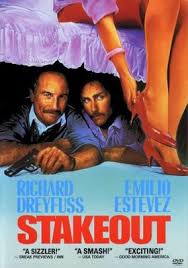
STAKEOUT
US, 1987, 116 minutes, Colour.
Richard Dreyfuss, Emilio Estevez, Aidan Quinn, Madeleine Stowe, Forest Whitaker.
Directed by John Badham.
Stakeout was a big box-office success in the United States in 1987, another success for the more adult branch of the Disney Studios, Touchstone Pictures. It is an enjoyable police buddy film with a very strong performance by Richard Dreyfuss. Emilio Estevez has to act as the straight man for Dreyfuss's performance. Aidan Quinn also gives a strong performance as a killer. The setting is Seattle, there is some tough police action, the Rear Window-like drama of the stakeout and the surveillance of the gangster's girlfriend and Dreyfuss's character falling in love with her. There is also an action-packed finale. The dialogue is witty - including film quizzes with Dreyfuss not knowing who said 'This is no ordinary boating accident' (his line from Jaws).
A familiar genre, but entertainingly done. Direction is by John Badham (Saturday Night Fever, Dracula, Blue Thunder, Short Circuit - and, with Richard Dreyfuss, Whose Life Is It Anyway?)
1. Audience familiarity with and enjoyment of the buddy film? Police buddies? Thriller? The blend of the serious and the comic?
2. The American atmosphere, the use of the city and harbour of Seattle? Police precincts, apartments, shops? Musical score?
3. The police in action on the harbour, the setting, Bill and Chris and action? The elaborate chase - and Chris with the fish? The details of Seattle port life giving authenticity?
4. The precinct, the members, the banter, jokes, the boss? The situation and the FBI, the assignment? The rivalry and the continued practical jokes between the two teams?
5. The breakout, the ambulance, the violence in the prison, the attack on the doctor and the guards, the escape and its timing?
5; The criminal and his escape, his cousin helping, hiding, robbing, the phone call to Maria, the drive to Seattle, the police chase, the river? The cousin dying? Audiences expecting that the criminal was dead?
7. Maria and her relationship with the killer, the breakout, her watching the news? her split from him? Her lifestyle, work, her brother and his being in prison, her concern? The effect of her being under surveillance, the audience sharing the prurient curiosity about her?
8. The teamwork of Richard Dreyfuss and Emilio Estevez as Chris and Bill? Seeing them work together, buddies? Bill's relationship with his wife? Chris and his girlfriends? The FBI and the surveillance? The elaborate technology, the techniques? The rivalry with the other team - grease-on faces, cats with dogs etc.? Their becoming fascinated with Maria? Their greater daring, Chris's going to the door, going in, meeting Maria, the phone man impersonation, the encounter at the supermarket, the irony of his driving her home, the meal? Bill looking on? The warnings by radio? The growing attraction, the sexual encounter, the early morning, the disguise and the police chasing him, the video? The tape of the phone call at home? The growing involvement? Bill covering? The police chase and the briefings?
9. Maria and her personality, attraction towards Chris? Her concern about him being a criminal? Chris and his emotional involvement? The alleged capture of the criminal? His decision to break, tell her the news and the truth? her looking at the surveillance equipment and disgust? The shock of the criminal arriving, Chris's pretence, the violence, Maria's decision to help, Bill on the roof, going to wharf, the boat and the criminal they were pursuing, the fight and the chase?
10. The reconciliation between Maria and Chris?
11. Crime, police themes, the violence of criminals, the techniques of the police, the expectations of the public on police and the pressures and their relief?
Published in Movie Reviews
Published in
Movie Reviews
Tagged under
Saturday, 18 September 2021 19:25
Spitfire
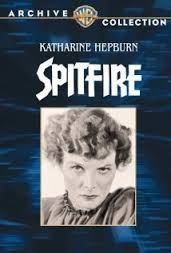
SPITFIRE
US, 1934,88 minutes, Black and white.
Katharine Hepburn, Robert Young, Ralph Bellamy.
Directed by John Cromwell.
Spitfire was Katharine Hepburn's fourth film. In retrospect it is an unusual vehicle. Adapted from a play, the film focuses on a backwoods girl and her religious faith - even to healing. Katharine Hepburn is good as the Ozark girl, accent and all - even though it does not fit in with the popular image of her screen persona. She is matched by Ralph Bellamy as an earnest dam engineer and Robert Young who plays with her emotions.
The film is an interesting look at life in the Ozarks - primitive and superstitious faith, a basic Christianity which nevertheless takes the essentials of faith in Jesus and his healing power to heart. It is a contrast with the exposes of the time against the exploitation of people like Aimee Semple MacPherson? (for example Barbara Stanwyck as The Miracle Woman). The film makes an interesting comparison with the '60s picture of a similar kind of woman, Angel Baby, with Salome Jens. Direction is by John Cromwell, director of several interesting films over the decades including The Prisoner of Zenda, Abe Lincoln in Illinois, The Goddess.
1. A '30s melodrama? For its time? Now?
2. R.K.O. production values, black and white photography, the studio used for locations? Musical score?
3. The screenplay based on a theatrical piece, adapted for the screen, opened out? A star vehicle for Katharine Hepburn? Her screen presence in the '30s? Later?
4. The atmosphere of the '30s: the Ozarks, the building of dams, the workers, the locals, city people coming in? The hillbilly way of life? Community and town, superstitions and religion?
5. Katharine Hepburn as Trigger: In the mountains, her accent and style, manner? Her dead mother? Friendship with Etta and their arguing, her taking in the washing? Living alone? Her friendship with Fleetwood and his support of her? The attraction towards John? Affection, falling in love? Eleanor's arrival and her eyes being opened? Her relationship with God, praying in a familiar manner (even winking)? The simplicity of her faith? Her Jesus cards and their old style holy picture presentations, the Gospel texts? Her taking them literally - even when she didn't quite understand them? Her concern about the old lady dying, her prayer, her seeming to appear and heal her? Her reaction to the news of her revival? The stories of the witch? Her stealing the baby, praying, wanting to protect it, Fleetwood's help? The parents and their concern? The police? The death of the baby? Her prayers for others? Her sense of failure? Burning the cards? Not burning the card with the Resurrection theme? The renewal of her faith? Her friendship with Etta, helping her to be smart and to change her image (and to keep quiet)? Her talking to Fleetwood, the promise to meet him later, her wanting to leave - and her being able to stay? A woman of honesty, simplicity, shrewdness, directness, faith?
6. Fleetwood and the building of the dam, his reading, fascinated by Trigger, friendship with John, concern about John and Eleanor, the baby and his helping, with the parents and the police? His love for Trigger? Her giving him some faith? His not being able to share her Christianity? The promise of her coming back and his waiting? The happy finale?
7. John as the engineer from the city, his work on the dam, friendship with Fleetwood, the infatuation with Trigger, affection, his leading her on, the arrival of Eleanor?
8. The parents of the baby, their concern, anger? The mother staying, the talk with Trigger, change?
9. Etta and her talking, her hopes, praying for five minutes, her change of dress, having to shut up, her wanting to go to the picture show? Another portrait of a simple hillbilly girl?
10. The portrait of the community, the changes in the building of the dam, the community close together? Bill and his walking through Trigger's property? His being the overseer? A go-between? The attitudes of the community, to the old lady's revival, to stories about witches, pushing the old lady out of the community, doing the same for Trigger?
11. The South, the mountains, faith, healing? Community styles, the closed community, prejudice? A piece of Americana?
Published in Movie Reviews
Published in
Movie Reviews
Tagged under
Saturday, 18 September 2021 19:25
Spies Like Us
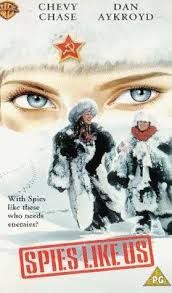
SPIES LIKE US
US, 1985, 102 minutes, Colour.
Chevy Chase, Dan Aykroyd, Steve Forrest, Donna Dixon, Bruce Davison, Bernie Casey, William Prince, Frank Oz.
Directed by John Landis.
Spies Like Us is an entertaining comedy. It was co-written by director John Landis with and Babaloo Mandel, the team responsible for such comedies as Ron Howard's Night Shift, Splash and Gung Ho.
John Landis began with eccentric comedies and directed such films as National Lampoon's Animal House, The Blues Brothers as well as such comedies as Into the Night, Trading Places and has dabbled with comic horror with An American Werewolf in London and an episode in Twilight Zone, The Movie.
The film is also a star vehicle for Chevy Chase and for Dan Aykroyd who collaborated with the script. (Aykroyd had worked with Landis in Trading Places, The Blues Brothers, as well as guesting in Twilight Zone and Into the Night.
The film has the usual theme of bumblers being used by the CIA as decoys. There is a clash with the Russians. However, the inept spies win out in the end - with the help of the attractive Donna Dixon.
A number of character actors have guest roles including Bruce Davison and William Prince. At one stage Rob Lowe moves through playing golf!
The film is interesting insofar as it reflects the build-up of military hardware in the U.S. and the USSR, especially the possibilities of the Star Wars shield development. By the end it seems almost inevitable that World War Three will have broken out and that the world will have become a nuclear victim. The heroes thwart the exploding of the nuclear warhead with split-second timing; (a bit like James Bond, both Sean Connery in Never Say Never Again and Roger Moore in Octopussy).
1. An entertaining American style comedy? Of the 1980s? Spoofing the CIA, the military? The serious themes of nuclear destruction and World War Three?
2. The work of Dan Aykroyd and John Landis? Their work in spoofs, satire? The use of character actors and guest stars?
3. The focus on the U.S., on Washington? On Nevada and the technological plant and facilities for weaponry? Space? The contrast with Asia, Afghanistan, USSR (and the effectiveness of Moroccan and Norwegian locations)? The bright and atmospheric score?
4. The cinema allusions and the entertainment for film buffs? The range of famous directors who take part in the film e.g. Terry Gilliam as a doctor in Afghanistan, Costa Gavras as one of the Russian rogue police, Michael Apted, Larry Cohen as Ace Tomato agents? Rob Lowe coming through? The humorous posters in the Russian outpost - Reds and Dr Zhivago? The clips from the '50s musical, She's Working Her Way Through College with Virginia Mayo and Gene Nelson - and Ronald Reagan popping up singing (and Reagan getting a credit in the film as the President of the United States)?
5. Ruby and Keys and their administrative style, the courier arriving and the putting him in the cupboard, the Generals arriving and their plans? Espionage and expediency? The plan for the decoys? Ruby and Keys' trip to Nevada, their ineptness and the Pepsi Cola joke, their descent down to the facility, watching the confrontation, denying any complicity? The comments on the spies and bureaucracy? Decoys and their
dispensability?
6. The satire on the military, the tough Generals, their tactics, plant, plans and deceits, manoeuvring the United States into war? Power? Their arrest?
7. The recruiting of the decoys? The blackmailing of them? The tests? Their training - and the spoof of such films as An Officer and a gentleman with all the things that could go wrong? The irony of their trainer being called Lazarus?
8. The military situation: the prologue with the warhead moving through the forest, the spies needed, the 21 year training for the authentic spies, the warheads and their being used, detonated, being contrived to get the United States to attack? The irony of the errors and the rectifying of the bomb by ordinary people? Being able to save the world from nuclear destruction?
9. Chevy Chase and his understated laconic humorous style? Fitzhume and his not doing any work, watching the Ronald Reagan movie? Decision to take the test? His performance during the test - his injuries, the range of cheating? The blackmail, going into training? The arrival in Pakistan? The operation and the range of doctors - and the humour on medical films? The escape? Disguise, travelling on the bus, the trek? His giving up? The encounter with the Russian police? His being rescued - Hi Ho Silver? The watching the Russian spies, the attack on the rocket? The waiting for the end of the world and the group's pairing off? His attraction towards the doctor? Helping with the detonating of the warhead? The ironic ending with the Trivial Pursuit game between Americans and Russians at Geneva - and his being the spokesperson?
10. The contrast with Dan Aykroyd's comic style? His being a decoder, knowledge of languages, skills? The test and his being victimised but collaborating with Fitzhume? The interrogation? The humour of the details of the training? In Afghanistan, trying to do the operation? On the bus? The horses, the escape, rescuing Fitzhume? The pairing with the Russian spy? His realisation of the solution and his saving the world?
11. The American and, Russian spies? The covers in Pakistan? The reactions of the tribes? The two decoys and their encounters with the tribes? The need for a successful operation? (And the humour of the doctor, doctor, doctor routine?) The reality of espionage, the death of the genuine spy? The doctor and her, trying to complete the mission? The Russians - and their dancing in the snow? The collaboration with the Americans?
12. Spies like us - on both Russian and American sides?
13. The comic routines, the verbal patter, the ironies, jokes? The mugging?
14. The serious undertones of the CIA, the military, the militarism of America and Russia? The reality of nuclear warheads, their development, the irresponsibility of people using them - and the hope that ordinary people can defuse them?
Published in Movie Reviews
Published in
Movie Reviews
Tagged under
Saturday, 18 September 2021 19:25
Spider and the Fly, The
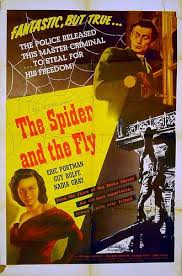
THE SPIDER AND THE FLY
UK, 1949, 92 minutes, Black and white.
Eric Portman, Guy Rolfe, Nadia Gray, George Cole, Edward Chapman, Maurice Denham, Arthur Lowe, James Hayter.
Directed by Robert Hamer.
The Spider and the Fly is an elegant character study with a pre-World War One setting leading into involvement in espionage during the war. It is a portrait of a genius safecracker who is able to cover his tracks even though known to the police. It is the portrait of a Surete official who, living in isolation, is dedicated to his work and to the unmasking of the safecracker. Between them is Madeleine who veers in her sympathy from one to the other. This web of interrelationships in a criminal world gives the meaning to the fable of the spider and the fly. There are some interesting supporting roles including some work from a very young George Cole.
Direction is by Robert Hamer, one of die Ealing directors who made such films as Kind Hearts and Coronets and Father Brown.
1. A period drama? Portrait of two men and the parallels of their experience and lives? A fable about influence, responsibility and honour?
2. The period setting? France in 1910 The war? Post-war? The musical score?
3. The title and its application? A moral fable?
4. The focus on Philippe and his skills in robbing safes? The build-up to his work, his stylish background, manner - yet his ruthlessness? His using people? His disguises? The return to Paris, having established unbreakable alibis? The frustration of Maubert? The mutual taunting of the two? Madeleine and her devotion to him, he to her? His being caught by Maubert? His prison sentence? The effect on his pride? The request by Maubert to steal the papers? The suspense of his carrying out his mission? Dangers? Skills? The confrontation with Maubert? The ambiguity of Madeleine's attachments? Philippe's final decisions and conscience?
5. The character of Maubert, the lonely man giving himself to his work? His study of Philippe? His knowledge of him? Their fencing at their meetings? The inability to get evidence? The final evidence and his trapping Philippe? Imprisoning him? The war and his transfer to espionage duties? The mission? His decision to commission Philippe? The interaction of the two? The control over Philippe? The importance of Madeleine and his attachment to her? Her changing roles? Her loyalties? Maubert's disappointment? The portrait of a dedicated officer of the law?
6. Madeleine and her attachment to Philippe, the encounters with Maubert and her dependence on him? Her decisions of loyalty Curing the war? Changing fidelity? The sign of contradiction between the two?
7. The portrait of the French police, their methods, detection, justice, prisons?
8. The atmosphere of the war, the war ministers, authorities, decision-making?
9. A blend of action melodrama, character study, moral fable?
Published in Movie Reviews
Published in
Movie Reviews
Tagged under
Saturday, 18 September 2021 19:25
Stranger in Town
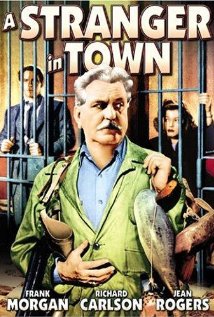
STRANGER IN TOWN
US, 1998, 95 minutes, Colour.
Harry Hamlin, Rebecca Jenkins.
Directed by Stuart Margolin.
Stranger in Town is an entertaining, if somewhat routine, television movie - even though it has an unexpected and rather implausible twist at the end. It has the old theme of a family getting out of the big city, trying to make its way in a country town, under suspicion from the locals. It also features the convention of the stranger in town who starts boarding with the family, helping to repair the house, gradually becoming suspicious, especially when a murdered body is found. Graham Green is also in the cast as the town eccentric, wandering around, stealing pies, also under suspicion for the murder. One's suspicions actually fall on the sheriff, who is quite ingratiating to the family. This is only to find that the minor character of his middle-aged female assistant is actually the murderer, leading to a rather melodramatic finale in a used and abandoned car area, with Harry Hamlin to the rescue of the son who has been suspicious of him all along, but has fallen into the clutches of the murderer.
1. An entertaining telemovie? Family themes? City versus country? Murder, suspicions, melodrama?
2. The city, the countryside, the small town, the details in the small town, shops, police station, cinema? The house and its needing renovation?
3. The title - for the family, for Jack?
4. The portrait of the family, Katherine and her being a widow, taking the children to the countryside, trying to get them settled in, the support of the son and daughter? Her having to cope, decisions about Jack, the builders cheating her? Jack finishing the house? The dead body, the growing suspicions? The danger to her son? The happy ending? The young boy, settling into the town, friendship with the young girl, his growing suspicions, protection of his mother, the little girl and her being brash, giving out information easily? His growing to depend on Jack, the fixing of the bike, working on the house? His becoming suspicious again, with the girl, trying to prove Jack guilty? His being with the policewoman, the revelation of the truth, her taking him to the car lot, trying to kill him, the rescue? The happy ending?
5. Jack, the stranger, the wanderer, the flat, helping with the house, violent outburst against the cheating workmen? Apologies, friendship with Katherine, friendship with Aaron, fixing the bike, helping him to work, being a father figure? Under suspicion, trying to explain himself to Aaron? His coming to the final rescue?
6. The man wandering around the town, stealing the pies, the townspeople's suspicions, wanting him imprisoned? The attack on him, his being innocent?
7. The sheriff, liking pies, always calling in, genial? His assistant - and her revelation of why she had committed the murder?
8. A satisfying popular entertainment with a range of ingredients from family life to murder and melodrama?
Published in Movie Reviews
Published in
Movie Reviews
Tagged under
Saturday, 18 September 2021 19:25
Solitary Man, The
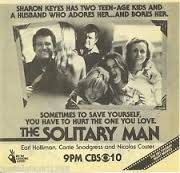
THE SOLITARY MAN
US, 1979, 96 minutes, Colour.
Earl Holliman, Carrie Snodgress.
Directed by John Llewellyn Moxey.
The Solitary Man is one of many telemovies taking on contemporary social themes. It dates from the end of the '70s. It focuses on a marriage, the husband who thinks that all is well, the wife who has been unable to communicate with her husband and wants to move away from the marriage and establish herself. The film has sympathy for all characters, but focuses principally on the husband. He is very well played by Earl Holliman, veteran of many films and television series including Policewoman. Carrie Snodgress is the wife.
The film presents families in detail, pressures at work, at school, with neighbours. It highlights the plight of the separated and the divorced, loneliness, need for relationships, coping with breaks in life.
Direction is by John Llewellyn Moxey, English director of many telemovies.
1. The impact of this film? Portrait of a husband? A broken family? Audiences identifying with characters? Situations?
2. The film as a piece of Americana? American family life, suburbia? Homes, workplace, schools? Authentic? Universal interest and appeal?
3. The title and its focus on Dave? The audiences invited to share his experience, understand him, watch him cope? Identify with him? Audience response to Sharon and understanding her moving out of the marriage? The children?
4. The portrait of the marriage: Dave and Sharon and 18 years of marriage? The bonds between the two? Love? Shared relationships? Their children? Work, home? The lessening of communication? Breakdown? Sharon and her stances? Dave and his bewilderment? His moving out? Sharon's demands? The effect on their children?
5. Dave and his background, sports-champion? His work and its tedious~ ness? Possibilities for promotion? His relationship with his wife? Not understanding her at all? Love for Davy and Amy? The trauma of Sharon's announcement? His going out, trying to cope and understand? Moving out?, The solitariness of his apartment? His friend trying to help him, build him up with women? The encounter with Lisa and her being a close friend of the family? Tricia as the sexy young woman half his age? His breaking off, fidelity to Sharon? Seeing the children, outings? Discussions? Attempts at reconciliation? The meal - and Sharon moving further away from him? His encounter with Jason and Davy, the basketball training? The coach turning up and offering him a new job? The friendship with Jason and his mother? Outings? The possibility of a new marriage, a new job, a new life?
6. Sharon and her background, the quality of the marriage, her liking for Dave, her not communicating, the frustration, her announcement, its timing, feeling? The effect on Dave? On the children? The possibility of reconciliation? her dating and her children's antagonism? Their going to their father? The final break?
7. The sketch of the children, at home, their love for each parent, the effect of the break-up emotionally, their looking towards their father, supporting their mother? Where were the preferences? Davy and his basketball, friendship with Jason?
8. Lisa and her friendship with Sharon, divorce, a device, making a play for Dave? Tricia and her discussion with Dave - too young, too forward?
9. Jake and his style of living, listening to Dave, trying to swing, advise Dave? Dave's failure at his attempts? Jake's confession that he was a brittle character?
10. The coach and his visit to the basketball, Dave and the vitality of working with the kids and training them? His future?
11. His work, friends, promotions, the boss, talking freely, leaving and being free?
12. Contemporary themes? Audiences understanding through identification and sympathy?
Published in Movie Reviews
Published in
Movie Reviews
Tagged under
Saturday, 18 September 2021 19:25
So Dear to My Heart

SO DEAR TO MY HEART
US, 1948, 84 minutes, Colour.
Burl Ives, Beulah Bondi, Harry Carey, Luana Patten, Bobby Driscoll.
Directed by Harold Schuster.
So Dear To My Heart is an attractive Disney film, full of joy and sentiment. It was Burl Ives' first film role. It has an attractive performance by Beulah Bondi as Grandma. Regular Disney youngsters Bobby Driscoll and Luana Patten are very good in the central roles of the children.
The film is in the vein of rustic Americana, popular in the '40s. It has a pleasing blend of animation and real-life drama. Amusing songs are inserted in the animation and into the live action quite skilfully and humorously.
The film is a piece of Americana - nostalgia about the old American way of life and values. It avoids sentimentality - and offers warm Disney entertainment.
1. An engaging film? Enjoyable? For the whole family? A film of the 140s? Perennial values?
2. The blend of live action and animation? The blend, the interconnections? An atmosphere of reality - yet life seen warmly through children's eyes? Pleasing fantasy?
3. The atmosphere of 1903, the country town, the farm, the fair? Trains, racehorses? Costumes and decor? Customs? Square-dancing? The songs: 'So Dear to My Heart' with its sentiment for the opening? 'Dan Patch', 'Stick-To-It-ivityl? 'It's Watcha Do With Watcha Got' - and the humour about proverbs? County fair? Burl Ives' rendition of 'Lavender Blue, Dilly Dilly'?
4. The animation: the scrapbook, the owl and his wise sayings, Dan the Lamb, the illustrations of the various proverbs - and the excursions into history with Robert Bruce, Columbus?
5. A portrait of children, especially Jeremiah? Bobby Driscoll's style as Jeremiah? His scrapbook and its coming alive, proverbs, Dan Patch, the lamb? His being looked after by his grandmother? Work on the farm, going to see Dan Patch at the train, the black lamb And his caring for it, the promise of the fair, going to Tildy to get the honey, the help of Uncle Hiram? Friendship with Tildy the loss of the lamb and their searching? The square dance scene at home? The loss of the lamb and Jeremiah's dissatisfaction with God? His grandmother's response? His promise not to go to the fair if the lamb was returned? Grandmother altering the promise? Family pride? The fair, missing out on the blue ribbon, the special award? The celebration 1Arthe town? The older man's voiceover? a nostalgic and romantic memoir?
6. Grandmother - her work, the ploughing, the lambs, bringing up Jeremiah? The friendship with Hiram - and the songs together - 'Lavender Blue', 'Billy Boy,? The happy atmosphere? Her religious beliefs? Her disappointment with Jeremiah and his lack of trust in God? Solving the problem about going to the fair? Her pride in his ribbon? A sympathetic grandmother?
7. Tildy and her friendship with Jeremiah, sharing his joy and activities?
8. Burl Ives' genial presence as Hiram? Character, helping Jeremiah, friendship with Grandmother? Songs and dance?
9. The portrait of the townspeople, the shopkeepers, the people at the fair, the judge's speech about Jeremiah and his lamb?
10. Americana - happy nostalgia, struggles and hardships, growing up?
Published in Movie Reviews
Published in
Movie Reviews
Tagged under
Saturday, 18 September 2021 19:25
Slightly Scarlet
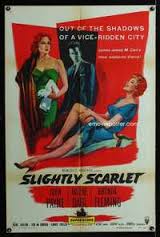
SLIGHTLY SCARLET
US, 1956, 92 minutes, Colour.
Arlene Dahl, John Payne, Rhonda Fleming, Kent Taylor, Ted de Corsia.
Directed by Allan Dwan.
Slightly Scarlet is an entertaining thriller about police, government corruption, gangsters. It is based on a story by James M. Cain (The Postman Always Rings Twice, Butterfly, Serenade).
The film was directed by veteran Allan Dwan, a maker of films from silent days to the '60s. It has colourful treatment, the Superscope process of the mid-'50s. The film also has a competent cast led by John Payne. However, the title refers to the two glamorous redhead sisters played glamorously by Rhonda Fleming and Arlene Dahl. The film shows the perennial themes of civic corruption, bribery and deals, the influence of gangsters. Very entertaining of its kind.
1. An interesting and entertaining thriller? Gangster thriller? Civic corruption?
2. The use of Superscope and colour, glamorous locations, seedy locations? The glamorous heroines in colour? Editing and pace? musical score?
3. The title and its reference to the leading ladies? To good and evil? The confrontation between the two sisters?
4. Ben Grace and his role with Sol Casper, his shrewdness. his deals, his links with the police and the promise of position, his attraction to wards June, influencing her, influencing Frank Jansen? The attacks on Casper and his gang by television, politicians? The murders? Grace and his attraction towards June? His following Dorothy, knowing about
her prison record, her flirting with him? The visit to Casper's beach house - and Dorothy's recklessness? His getting rid of Casper.- stepping into his shoes, having a police chief at his disposal? Dorothy's arrest and his beginning to pull strings? June's realisation of what he was about? His trying to get Casper's money, the decision to leave? June's refusal? The final set-up, confrontation with Casper, the shoot-out? His change of heart because bf June? The American gangster hero type?
5. June and Dorothy, Dorothy's emerging from prison, her blaming June? June and her work with Frank Jansen, her influence? The love between the two sisters, their growing up. June as protective. Dorothy as resentful, her stories about stealing? Having to cope with Dorothy's kleptomania? The arrest, June pleading with Grace? her discovery of the truth? Dorothy's flaunting herself with Grace? The encounter with Casper? The build-up to the shoot-out? Dorothy's bewilderment,
fear of going to prison or hospital? June's devotion to her? An ~interesting portrait of sisterly relationships, dependence, clash, rivalry?
6. The picture of the control of the city, elections, Frank Jansen as honest, Sol Casper and his murder of his critics? The taping of conversations, the deals with police chiefs, the need for controlling corruption?
7. The realism of the action? American cities and administration? The film's critique of corruption - via the thriller conventions?
Published in Movie Reviews
Published in
Movie Reviews
Tagged under